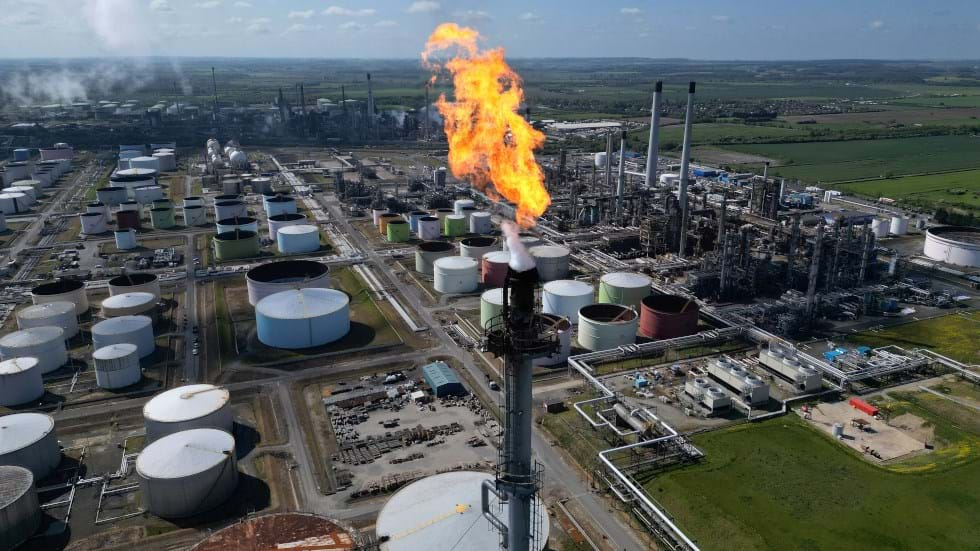‘No credible offers’ forces Lindsey refinery to close

THE UK will see one third of its refineries close in just four months after the government announced no credible bidders have come forward to save Lindsey refinery in Humberside.
The refinery was placed into insolvency in June, which the government blamed on the conduct of its owners Prax. Energy minister Michael Shanks announced earlier this week that selling the refinery is no longer an option.
“After a thorough process to determine whether a sale was possible, no credible offers have been made to purchase the entire refinery and it will be winding down operations,” he said.
“The refinery will continue to process crude for the rest of the month, and the official receiver will continue selling refined products for a number of weeks, giving buyers time to adjust their supply chains.”
Alan Gelder, senior vice president of refining at energy consultancy Wood Mackenzie, said he is surprised the site is being closed., Following independent analysis of Lindsey, Gelder concluded the refinery is a viable operation.
“When we look at sites we're trying to assess how much cash they generate. So we look at operating costs, crude coming in, products coming out and so on. That site for us was generating cash,” Gelder said.
“For the people at the site it is a tragedy because I'm sure they had no idea it was coming. And they're probably not responsible for it. I suspect it's something with how Prax and all its various subsidiaries were set up. We think it’s more that than the fundamentals of converting crude oil to products in the UK.”
The government said the owners left the company in a poor state and has ordered an investigation into their conduct.
Reverse the decision to abandon a sale
Sharon Graham, general secretary of the Unite union, urged the government to reverse the “premature decision to stop buying crude oil and to extend the time to find a viable long-term solution for the site.”
Following the closure of Scotland’s Grangemouth refinery in April, the loss of Lindsey leaves the UK with just four operational refineries.
Graham said: “The government can’t sit on the sidelines any longer. The Lindsey refinery is critical national infrastructure and is essential for the UK’s fuel supply and the health of the regional economy.”
Asked if he was surprised that the government has given up on finding a buyer after three weeks, Gelder said: “Could they have found a buyer? Probably. Would it have taken a long time to have done it properly? Yes. Did the government want to take the risk of how the refinery would perform over that time period? Evidently not. Does that mean the government thinks refining is strategic? It means they think it is not.”
Fuel security
The government said the UK has a diverse and resilient fuel supply and that it works closely with the fuel sector to ensure that supplies for the UK are maintained.
Answering questions in parliament, Shanks said: “Lindsey oil refinery comprises about 10% of our remaining refinery capacity. Phillips 66—a much larger refinery—is immediately next door.
“In the past few weeks, we have already seen fuel supplies adjusted and commercial contracts renegotiated. Although we clearly wanted the refinery to stay open, our assessment suggests that there is not an immediate risk to fuel supplies locally or in the wider area, but we will continue to monitor that.”
Gelder said that the loss of Lindsey’s 110,000 bbl/d will likely see the UK have to increase imports, though not significantly.
“Will that loss of production at Lindsey automatically go to the other refineries in the UK? Probably only a portion of it. We'll need to import more jet [fuel] and more diesel. That will largely come from further afield because we're importing those volumes already.”
The owners of Scotland’s 150,000 bbl/d Grangemouth refinery ceased operations because of high maintenance costs, falling demand for fuels and an inability to compete with larger overseas refineries.
Gelder noted that European refining has issues with high energy costs and carbon charges, though he believes the outlook for refineries should be improving given there is sustained growth in oil demand and planned capacity expansions across the sector are nearing completion.
Worker support
Closure of Lindsey will see 420 people lose their jobs.
Shanks said: “The government will immediately fund a comprehensive Training Guarantee for these refinery workers to ensure they have the skills they need and are supported to find jobs in the growing clean energy workforce.”
Chemical engineers affected by the closure have access to IChemE’s Career Change Support Hub which includes advice, tools and links to financial assistance through the Chemical Engineers Benevolent Fund.
Recent Editions
Catch up on the latest news, views and jobs from The Chemical Engineer. Below are the four latest issues. View a wider selection of the archive from within the Magazine section of this site.




